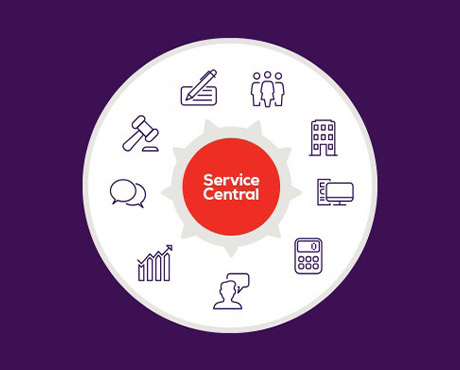
Include an additional SELT question
News 17 MayStaff can include an additional question in the Student Evaluation of Learning and Teaching (SELT) survey for units that are offered in Term 2 (Foundation Studies) (202334).
15 February 2017
Share

A message from the Deputy Vice-Chancellor (Research) Professor Wayne McKenna: In December 2015, the Australian Government announced its National Innovation and Science Agenda (NISA), which has a key interest in improving the commercial returns of publicly-funded research.
In pursuit of this agenda, the ARC will introduce an assessment of the engagement and impact of research in Australian Universities in 2018.
Intended to assess how Universities are engaging with end-users and how research is producing tangible impact beyond the academic context, the inclusion of engagement and impact measures is designed to recognise that the societal benefits of research might also be measured outside the scope of the more traditional parameters of excellence: publication, citation, and grant funding.
In order for researchers to understand how their research is conducted within this new paradigm, it is essential to understand what it is we mean when we speak about ‘engagement’ and ‘impact.’
By the ARC’s definition, engagement denotes the interactions that take place between researchers and research end-users. This interaction, which might facilitate the exchange of knowledge, technologies and methods, or resources, occurs in a spirit of partnership and reciprocity.Engagement, therefore, is something that can be built into a plan for research.
By collaborating with and including end-users in conducting research, publishing with collaborators external to ACU, and seeking co-funding for research projects, engagement can be planned for from the outset.Not to be confused with engagement, impact is, by its most basic definition, about making a difference. The ARC defines impact as 'the demonstrable contribution that research makes to the economy, society, culture, national security, public policy or services, health, the environment, or quality of life, beyond contributions to academia’ (ARC, 2012).
And whilst all research is conducted with the core principle of making a contribution, of uncovering something new (frameworks, ideas, understandings etc.) it can be something of a challenge to demonstrate that this contribution also has impact.Impact can take many forms. It might be economic, environmental, cultural, legal, or technological. It might be changes to public policy informed by the findings of research or, similarly, it might be measurable changes in the health and wellbeing of a population.
As with the introduction of any new assessment method, challenges emerge where there exists a lack of historical planning for these measures. Impact is something that happens up to decades beyond the end of a research project. But, like engagement, it is also something that we can plan for before research begins.
Researchers are now required to reconfigure the way they think about and plan the research they do to ensure that outcomes will produce not only high quality outputs but will engage with relevant end-users and be impactful as well.
Ahead of the 2018 ERA round, the ARC has released a briefing document on an Impact and Engagement Assessment Pilot (EIAP) to take place in 2017. ACU was invited, along with all Australian Universities, to take part in the pilot, and will submit quantitative data for the assessment of engagement, and relevant ‘impact studies’ to support the assessment of impact.
Preparation for ACU’s submission to this pilot is already underway across the University with ten internal panels established to lead the development of ACU’s pilot submission in 2017.The pilot will inform the inclusion of Impact and Engagement in ERA for the first time. Feedback on our submission to the pilot study will be released to ACU in late 2017 and, we expect, will be a valuable opportunity to gauge the performance of ACU’s Research within the parameters of impact and engagement, providing the University with valuable feedback to be utilised in the 2018 submission.
Looking forward, an understanding of the shift that NISA represents will benefit researchers across the University and assist them in embedding engagement and impact into their research plans. Increasingly, engagement and impact will need to be an explicit and demonstrable outcome of research and mechanisms to produce that impact and to engage appropriate collaborators and end-users should be built into the research process from inception.
Professor Wayne McKenna

Staff can include an additional question in the Student Evaluation of Learning and Teaching (SELT) survey for units that are offered in Term 2 (Foundation Studies) (202334).

Read a summary of the Academic Board meeting held on 12 April 2023.

The university takes academic misconduct very seriously. For a student, receiving an academic misconduct allegation letter can be highly stressful. Support is available.

Read the latest on the MFA for Students rollout.

If you are considering applying for promotion, come along to an upcoming information session – Understanding the New Academic Promotions Process.

ACU Co-Lab is proud to unveil its latest commercialisation program, Translate to Innovate Series, a specialised program targeting ACU’s research community.

A message from Executive Dean of Theology and Philosophy Professor Dermot Nestor: Purpose is what defines a Catholic university and galvanises the people who work within it.

See the TechOne P2P work instruction videos and modern slavery training modules which have been created to help grow your understanding of the subject matter, your responsibilities and the processes i...

A recording of last week’s Global Learning Showcase is now available to view if you were unable to attend. See what you may have missed.

Do you implement innovative strategies in your teaching that motivate and inspire students to learn? Receive recognition for your efforts by applying for an ACU Citation or VC Teaching Award.

Promotion recognises and rewards an academic’s achievements at their current level of appointment that warrant promotion to the next academic level. This year’s round marks a significant shift in the ...

A message from Executive Dean of Law and Business Professor Andrew O’Neil: I am committed to ACU’s continued success, with a contribution that places a premium on impact and growth.

Stay informed on recent changes to the Procurement Policy, approvals for purchases, how to raise mandatory purchase orders and related knowledge base articles.

As of Monday 8 May, Service Central phone support hours have changed to 9am–5pm AEST. Live chat remains available between 9am–5pm AEST.

You’re invited to attend local morning or afternoon tea events at the following local campuses hosted by the ACU ALLY Network, with the support of the Campus Deans and campus LGBTIQA+ Student Societie...

ACU’s business incubator, Co-Lab is delighted to announce details of its 2023 Circular Economy Incubator Series, designed for people and businesses with principles and practices of circular economics...

Do you have innovative ideas for program and curriculum development or initiatives to enhance student learning experiences that would benefit from funding? CEI has launched Teaching Development Grants...

Attend an online showcase to meet the Global Learning team, gain useful advice and find out how our various learning and engagement programs are developed and managed.

A message from Interim Provost Professor Meg Stuart: A unique new program for first year students is improving student retention at ACU.

Register for a webinar presented by the ACEN on the Graduate Outcomes Survey, focusing on a three-year evaluation of student participation in Work Integrated Learning.
Visit Service Central to access Corporate Services.